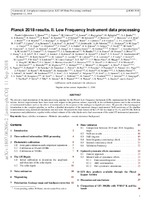| dc.contributor.author | Akrami, Yashar | |
| dc.contributor.author | Argüeso, Francisco | |
| dc.contributor.author | Ashdown, Mark A.J. | |
| dc.date.accessioned | 2020-11-06T10:57:33Z | |
| dc.date.available | 2020-11-06T10:57:33Z | |
| dc.date.issued | 2020 | |
| dc.identifier.citation | Akrami, Y. et al. (2020). Planck 2018 results: II. low frequency Instrument data processing.Astronomy and Astrophysics.461,A2. Doi: https://doi.org/10.1051/0004-6361/201833293 | en_US |
| dc.identifier.issn | 1432-0746 | |
| dc.identifier.uri | http://hdl.handle.net/10566/5375 | |
| dc.description.abstract | We present a final description of the data-processing pipeline for the Planck Low Frequency Instrument (LFI), implemented for the 2018 data
release. Several improvements have been made with respect to the previous release, especially in the calibration process and in the correction
of instrumental features such as the effects of nonlinearity in the response of the analogue-to-digital converters. We provide a brief pedagogical
introduction to the complete pipeline, as well as a detailed description of the important changes implemented. Self-consistency of the pipeline
is demonstrated using dedicated simulations and null tests. We present the final version of the LFI full sky maps at 30, 44, and 70 GHz, both in
temperature and polarization, together with a refined estimate of the solar dipole and a final assessment of the main LFI instrumental parameters | en_US |
| dc.language.iso | en | en_US |
| dc.publisher | EDP Sciences | en_US |
| dc.subject | Space vehicles | en_US |
| dc.subject | Instruments | en_US |
| dc.subject | Methods | en_US |
| dc.subject | Cosmic microwave background | en_US |
| dc.subject | Data analysis | en_US |
| dc.title | Planck 2018 results: II. low frequency Instrument data processing | en_US |
| dc.type | Article | en_US |

